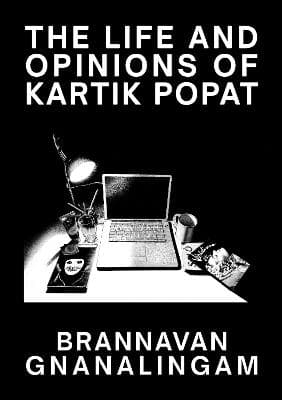Review: The Life and Opinions of Kartik Popat
Reviewed by Angelique Kasmara
Brannavan Gnanalingam’s latest novel, The Life and Opinions of Kartik Popat, is billed as satire. However, its eponymous anti-hero is so sharply drawn, as are the absurdities he navigates—or orchestrates—while revolving through different roles in Parliament, that I found myself questioning whether any of it was satirical at all. Despite this, it’s a necessary label for the book, if simply to flag intent: many thinly disguised real-life figures litter the novel’s Parliament hallways, and when you consider we’re in an age where satirical media company The Onion wins conspiracy theorist Alex Jones’ Infowars in a bankruptcy auction that feels like a headline ripped straight from its own pages, it would seem a politic choice.
Kartik Popat is the kind of guy who blithely muses, ‘what if I sold some pills and used that to say [the pills] warded off Covid based on overseas research’? He mercilessly trolls an acquaintance online, his hatred for her initially sparked by her ‘worst’ taste in movies as his own auteur film aspirations stall, and snipes about ‘earnest kids’ when manufacturing arguments against climate change. Popat’s views are not to be confused with the author’s own, whose credentials include being grumbled about for producing ‘Woke Fiction’ in a Newsroom review for his Ockham-shortlisted novel, Sprigs.
It’s also worth noting that satire is by definition, humorous, and indeed there are many laugh out loud moments, both alongside and fuelling the scorching social commentary. In the middle of some very odd sex (‘“I’m pretty sure we’re having penetrative sex,” to which she said, “You probably don’t understand New Zealand’s history of Mormonism,”’), Kartik realises that he ‘had no idea what perimenopausal meant because St Luke’s sex ed was limited to detailed explanations of wet dreams—maybe Annie had just described some bougie prophylactic’. An excruciating round of introductions where his surname is wilfully mispronounced concludes with, ‘his bite is like a bed bug’s, annoying but nothing that throwing away the mattress wouldn’t fix’.
The novel spans the periods between 1987 to 2024, following the Popat family’s move to Te Whanganui-a-Tara Wellington from Zimbabwe. Kartik’s chaotic prose captures the tumult amidst possibility in the heady early days of the Internet, before we realised just how malignant the algorithm machine would become, and indeed the story also works as a bildungsroman of the impact of social media in shaping modern politics. His grammar-defying sentences could also be interpreted as a sly middle finger to the idea of the model minority, and that generation of kids who grew up excelling in English in response to being constantly asked, ‘Do you speak English?’
Kartik did excel at school - we’re regularly reminded that he received a 424 in Bursary and three scholarships. A lonely, bullied child, he fails to develop any sort of moral compass by adulthood, possibly spurred by achievement granted by grasping any dubious opportunity available, where others might hesitate over the ethical implications. At times this opportunism appears almost visionary. Kartik recognises the power of social media in its early days, so is handed a role to machinate Party fortunes. At other moments, his go-with-the-flow modus operandi appears foolhardy, such as the method used to extract a considerable donation for the Party. His exploitation of the pandemic years, whether through selling vitamins repackaged as protection against COVID-19 or amplifying the worst and loudest voices, feels both inevitable and confronting: ‘we devised a strategy that was going to take advantage of the internet better than anyone else, due to my long-standing experience of harnessing the algorithms and getting people to view my content.’
An unspoken trope of literary fiction POC characters in our local landscape is that they might be complex but also, be ‘worthy representations’. Publishers Lawrence & Gibson threw out this memo and we’re better for it. Compelling insights into The Life and Opinions of Kartik Popat include why any POC would, and indeed have been known to, cosy up to those who might like your vote and your support, but mostly, would like you to be white. Kartik himself would like you to be white: ‘I wasn’t thrilled by sitting in a cafe with another Indian man, in case people thought that was who I hung with on an ordinary basis, especially one with an accent as treacly as his’. For all the politicking, the novel itself is a joyful anarchic riot as Gnanalingam cheerfully smashes down the drawbridges to usher in a new chapter in Aotearoa New Zealand literature.
Angelique Kasmara is an author and editor in Tāmaki Makaurau.
